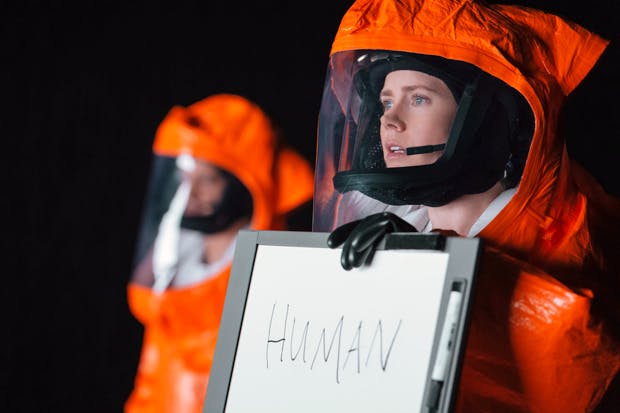Arrival is a big budget sci-fi film with a smaller, more pensive, cleverer film trying to get out, which has to be an improvement on a dumb film with an even dumber film trying to get out, as in the manner of Interstellar, say. So we have that to be thankful for, at least.
The film stars Amy Adams, who appears to be everywhere these days. (Check your sock drawer and under the bed; you never know.) She plays Dr Louise Banks, a university linguist who lives in a beautiful, modernist lakeside house, as any academic in any American film always does. (Do such houses come with tenure?) As we see right at the start, she is mourning the death of her daughter. You are not meant to understand how this figures until the ‘twist’ in the film’s final moment, which has been much applauded by other critics, although I have to say I saw it coming a mile off, if not ten miles off. Not bigging myself up here. Simply a plain fact.
But the main action in Arrival starts when alien pods …you know …arrive. These pods, which look like ginormous pumice stones hovering just above the ground, are eerily and richly realised, and have taken up residence at 12 sites across the globe. World governments are perturbed, naturally, and Louise is visited by a colonel from the US military (Forest Whitaker) who plays her a recording of the alien’s growly, echoey sounds, like tummy rumbles amplified. He wants to know: do we think they missed lunch? Shall we offer them a baguette from Pret? I’m toying with you. He wants to know: could Louise learn this language? And determine what the aliens’ purpose on earth might be. Are they peaceable? Or not?
Louise is shipped to a field in Montana, where one such pod hovers, and so far, so good. Adams is everywhere — did you check behind the sofa cushions? — because she can deliver extraordinary emotional heft and depth while seemingly doing very little. Directed by Denis Villeneuve (Prisoners, Sicario), the scenes leading up to Louise’s first encounter with the aliens are by far the best scenes. They’re tense, unnerving, grandly sombre and visually impressive as she dons her biohazard suit and enters the pod via a tunnel that seems to be no respecter of gravity. I won’t describe the aliens in detail here because the reveal is 87.4 per cent of the fun. I will say only that they’re monstrous but also strangely balletic and tender. Louise sets to work, as aided by a physicist (Jeremy Renner, given almost nothing to do as his character is required for only one plot point, but he does almost nothing with some grace and charm).
The aliens, it transpires, not only have a native language, but also a written language. Their writing is beautiful: inky, smoky, black hieroglyphics as drawn by ‘hands’ that look like giant star anises. (That’s all I’ll say.) However, their written language isn’t like our written language. It’s not simply what they speak, written down. Their written language, which Louise seems able to decipher miraculously quickly — whaaaat? How did that happen? — blows her mind, and also starts to affect it.
The film is based on the short story ‘Story of Your Life’ by Ted Chiang, which explores the notion that our view of the world is shaped and determined by language, so if we had another kind of language, how might our world look then? This is something to think about, certainly, but then the demands of big-budget sci-fi call, so Louise has to rush off and race against time to save the world and talk down the global powers who have misinterpreted the aliens’ intentions and are about to declare war on them and blah-de-blah. (China and Russia are the most war-y, obviously.)
At this point, Arrival itself stops thinking about thinking and instead opts for the usual, sci-fi-genre third act; a third act that, in this instance, is noisy and wholly implausible as well as tiresomely familiar. Military helicopters, fingers hovering over red buttons, and so on. You know the score. The film does ask some interesting questions but, in the end, ignores the questions it has asked, abandons all smarts, and leaves us hanging. For example, if the alien’s language has rewired Louise’s brain so she can see her own future, why can’t she choose to not live that future? Also, if the aliens’ purpose was to share their language with us, but only Louise understands that language, was that really worth 12 pods and all the hassle? And why did they want to give us their language anyway?
We’ll never know but, like I said, better a big film with a clever, smaller film trying to get out than Interstellar or similar. Every time.
Got something to add? Join the discussion and comment below.
Get 10 issues for just $10
Subscribe to The Spectator Australia today for the next 10 magazine issues, plus full online access, for just $10.














Comments
Don't miss out
Join the conversation with other Spectator Australia readers. Subscribe to leave a comment.
SUBSCRIBEAlready a subscriber? Log in